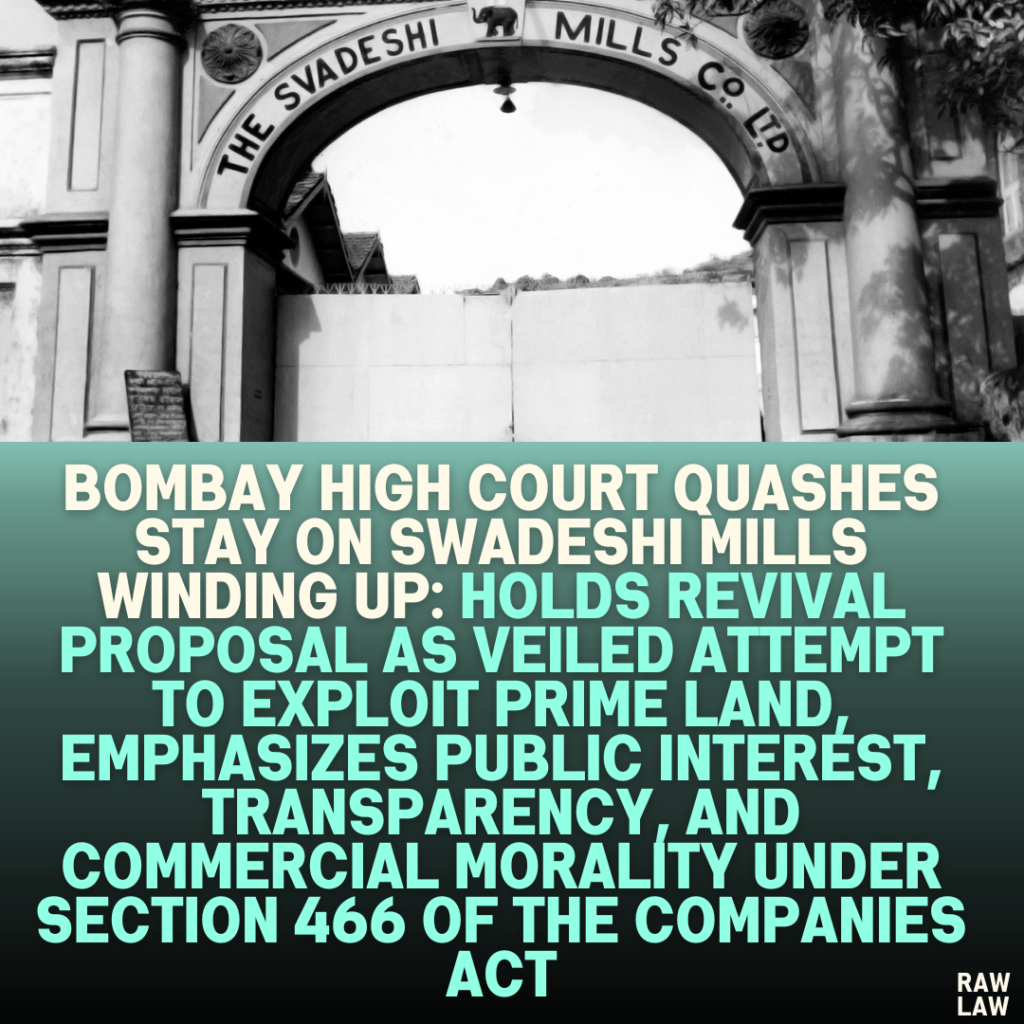Court’s Decision
The Bombay High Court set aside two impugned orders: one dated October 9, 2023, and another dated December 21, 2022, passed by the Company Court. These orders had permitted a stay on the winding-up of Swadeshi Mills Company Limited. The High Court ruled that the respondents’ revival proposal was not bona fide and that it undermined public interest and commercial morality. The Court directed the Official Liquidator to continue the winding-up process under the supervision of the Company Court.
Facts
- Background: Swadeshi Mills was declared a “sick company” by the BIFR under the Sick Industrial Companies (Special Provisions) Act, 1985, leading to its winding-up order in 2002. The Official Liquidator was tasked with handling the liquidation process.
- Past Attempts to Stay Winding Up: In 2011, certain shareholders (respondents) filed an application under Section 466 of the Companies Act, seeking to stay the winding-up proceedings. This application was rejected by the Company Court, Appeal Court, and Supreme Court.
- New Revival Plan: In 2020, the respondents entered into agreements to settle workers’ dues and filed another application under Section 466 in 2022, claiming changed circumstances and seeking a stay on winding up.
- Company Court Orders: In December 2022, the Company Court allowed the application, directing the respondents to deposit ₹240 crores. In October 2023, it issued further directions, effectively granting a stay on winding-up.
Issues
The High Court identified three critical legal issues:
- Bona Fide Intent: Whether the respondents’ application under Section 466 was genuine or motivated by self-interest.
- Principles of Commercial Morality and Public Interest: Whether the revival plan served the greater good and upheld public confidence in judicial processes.
- Circumvention of Liquidation Procedures: Whether the application was a veiled attempt to acquire company assets without going through public auction or statutory processes.
Petitioner’s Arguments
The petitioners, opposing the stay on winding-up, argued:
- History of Rejection: Previous orders by the Company Court, Appeal Court, and Supreme Court had rejected similar applications by the respondents, citing lack of bona fide intent and public interest concerns.
- Real Estate Motivations: The revival plan was not aimed at resuming business but at exploiting Swadeshi Mills’ prime land for real estate development without public auction or transparency.
- Ignored Precedents: The impugned orders failed to consider findings from earlier proceedings, where courts had highlighted the respondents’ ulterior motives.
Respondent’s Arguments
The respondents defended the impugned orders, stating:
- Changed Circumstances: Settlements with workers and a deposit of ₹240 crores showed their commitment to reviving the company.
- Public Benefit: The revival plan included low-cost housing, rehabilitation of workers, and development projects, which aligned with public interest.
- Procedural Fairness: The orders were in line with Section 466 principles, and no legal infirmity justified appellate interference.
Analysis of the Law
Section 466 of the Companies Act, 1956 grants courts the discretion to stay winding-up proceedings if satisfied that such a stay is necessary and justifiable. The Court emphasized the following legal principles:
- Bona Fide Intent: Applications under Section 466 must be genuine, demonstrating a clear intent to revive the company, not exploit its assets.
- Public Interest and Commercial Morality: Revival schemes should benefit all stakeholders, not just a select few. Courts must ensure that such schemes do not erode public confidence in the judicial system.
- Judicial Scrutiny: The Company Court must exercise discretion judiciously, considering all relevant facts and circumstances.
The Court relied on precedents such as:
- East India Cotton Mills Ltd. – Highlighting the importance of public interest and corporate morality.
- M/s Meghal Homes Pvt. Ltd. – Revival plans must genuinely aim to resurrect the company or part of its business, not dispose of its assets privately.
- Neelkantha Kolay v. Official Liquidator – Mere creditor consent or financial offers are insufficient; broader societal and commercial interests must be protected.
Precedent Analysis
The Court drew extensively from previous judgments:
- Bombay High Court, 2011: Found the respondents’ 2011 revival plan to be a veiled attempt to acquire Swadeshi Mills’ prime land for real estate development, bypassing public auction.
- Appeal Court, 2013: Upheld the 2011 decision, stating that the respondents’ plan was not bona fide and violated public interest.
- Supreme Court, 2016: Dismissed an SLP against the 2013 judgment, affirming that the respondents’ motivations were suspect.
The Court noted that the impugned orders failed to address these findings, undermining their validity.
Court’s Reasoning
- Non-Consideration of Past Findings: The Company Court’s 2023 and 2022 orders ignored critical findings from earlier proceedings, which highlighted the respondents’ ulterior motives.
- No Genuine Revival Plan: The respondents’ proposal focused on real estate exploitation, not reviving the company’s textile business or resolving its liabilities equitably.
- Public Auction as a Safeguard: The respondents sought to bypass public auction and acquire assets at undervalued rates, undermining transparency and fairness.
- Judicial Vigilance: The High Court emphasized its duty to protect public interest, ensuring that winding-up processes are not misused for private gain.
Conclusion
The High Court quashed the impugned orders, reaffirming that:
- The Official Liquidator must proceed with the winding-up process.
- Revival plans must genuinely serve the interests of the company and stakeholders, not private parties.
Implications
This judgment underscores the importance of judicial oversight in winding-up proceedings. It sends a strong message against attempts to misuse Section 466 for personal gain, ensuring that:
- Public interest and commercial morality are upheld.
- Liquidation processes remain transparent and equitable.
- Courts maintain their role as protectors of societal and commercial justice.
By emphasizing these principles, the Court bolstered confidence in judicial processes and reinforced the need for integrity in corporate affairs.



